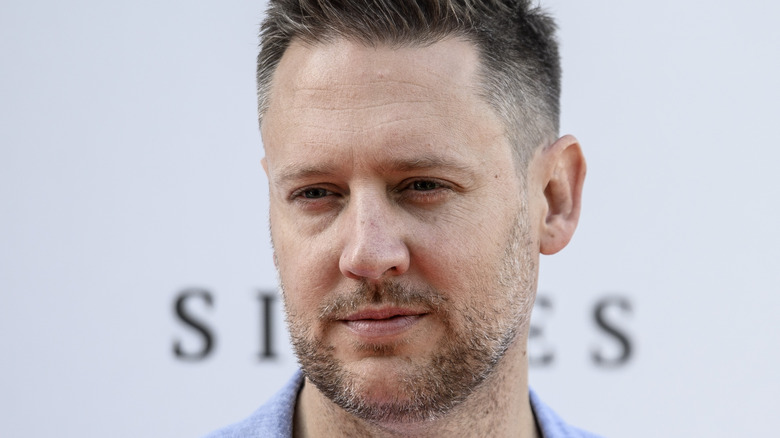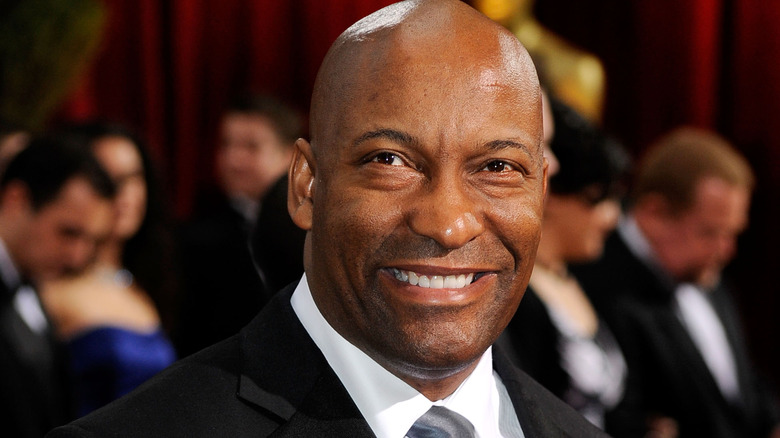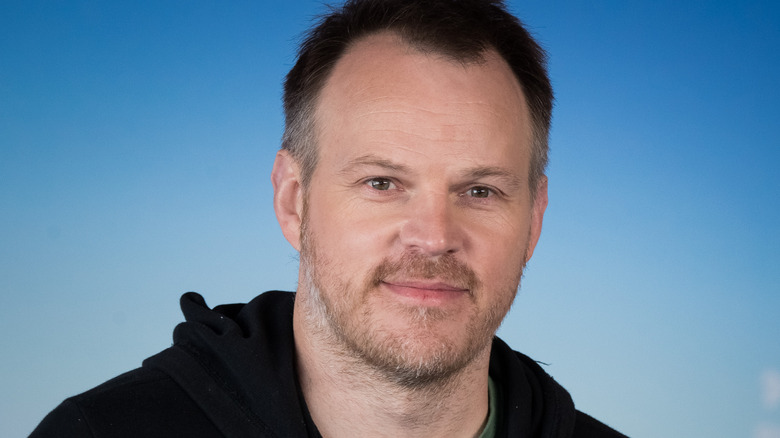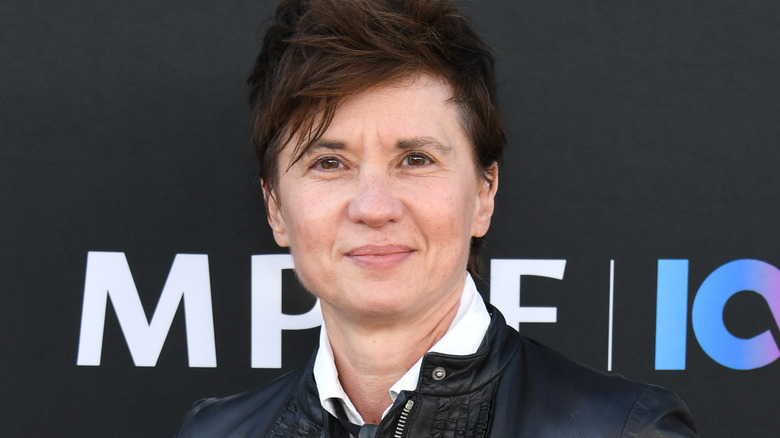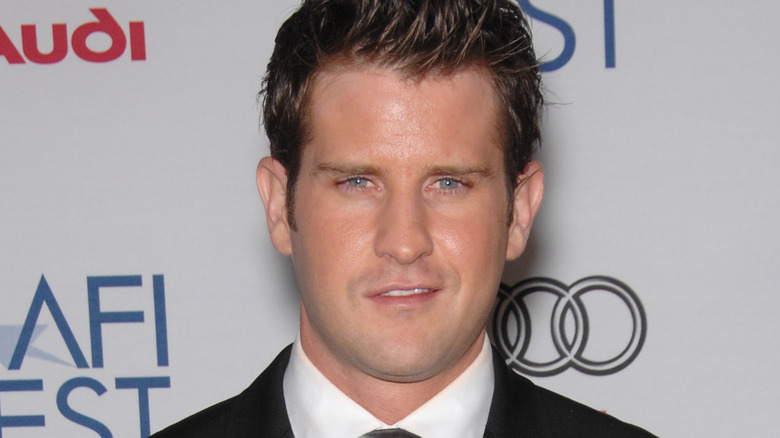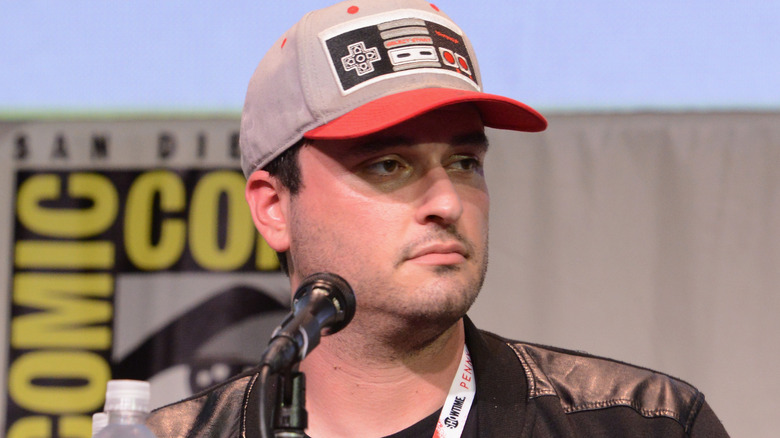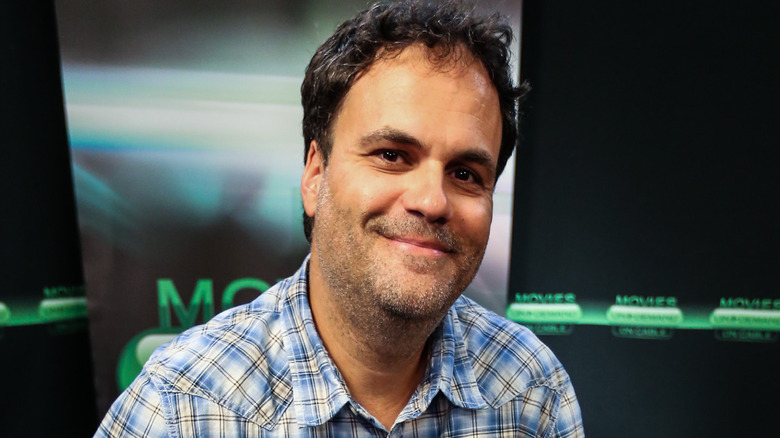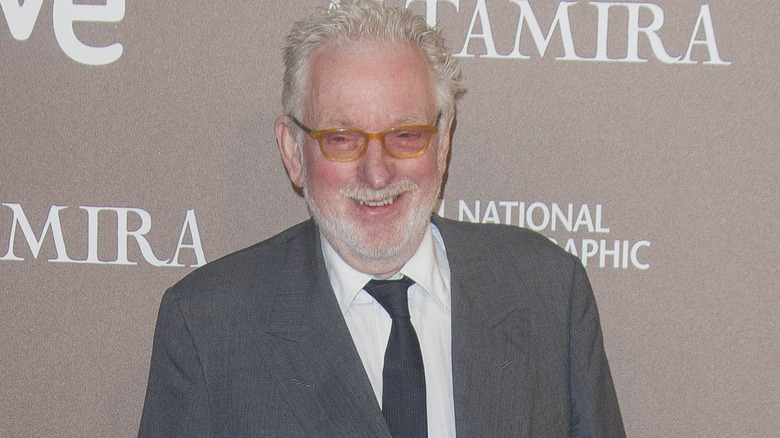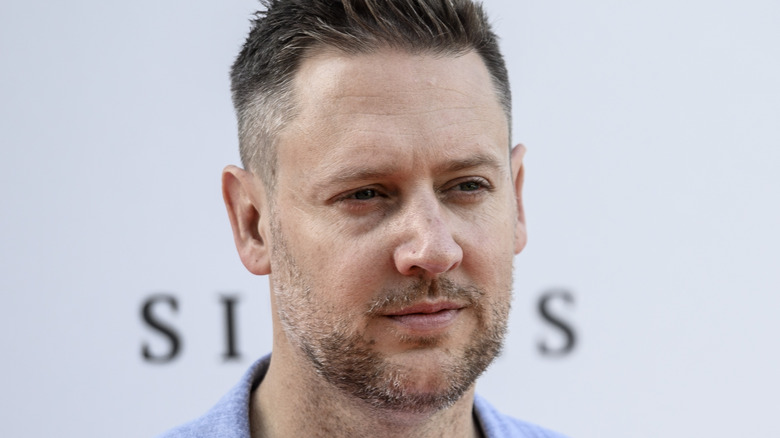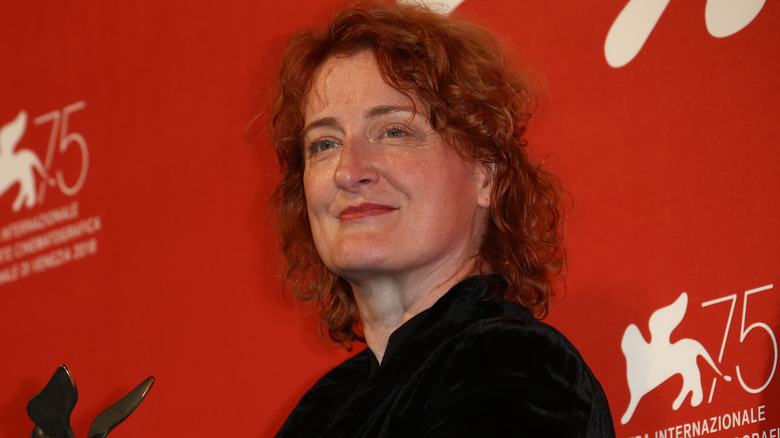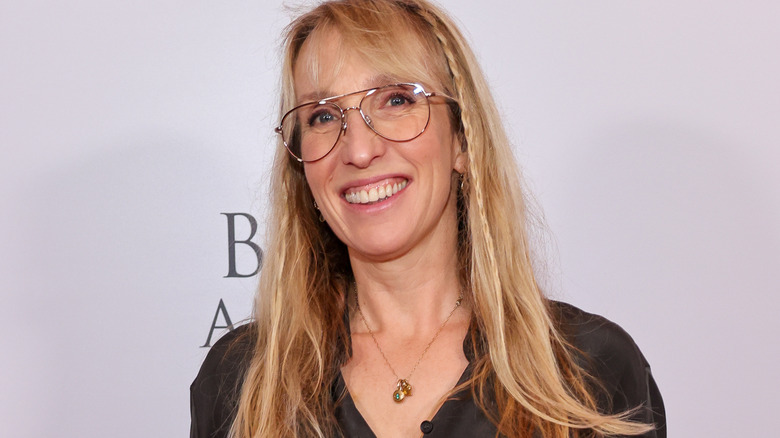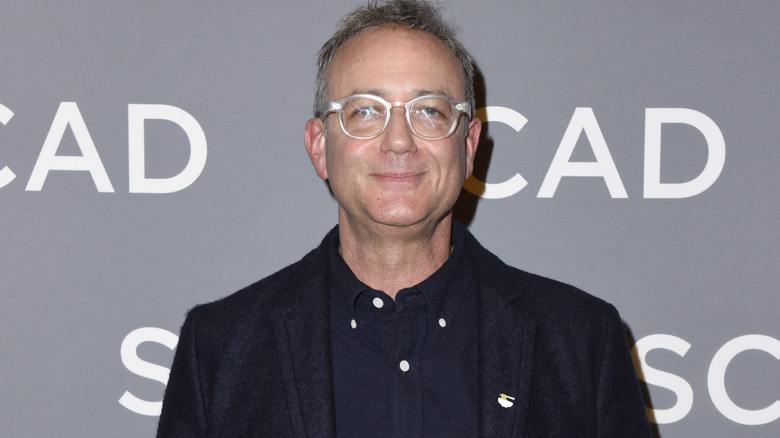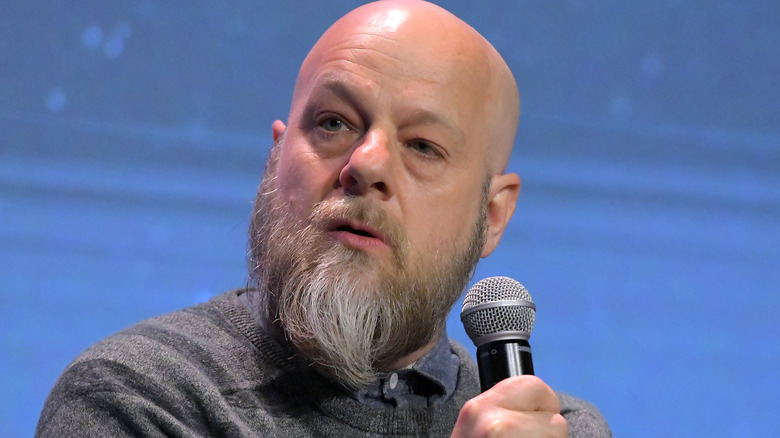Directors Who Struggled To Live Up To Their Debut Films
It's not uncommon for a filmmaker to come storming out of the gate with a strong first showing. In more recent years it's happened quite often, with the likes of Ryan Coogler ("Fruitvale Station"), Greta Gerwig ("Ladybird"), and Robert Eggers ("The Witch") all meeting critical acclaim. Such impressive directorial debuts are usually seen as a sign of things to come, and more often than not, that's exactly the case, as all three of those directors have gone on to further greatness, with the likes of "Creed," "Little Women," and "The Northman" as their follow ups.
Though all of those directors found later success and are now considered among today's best filmmakers by consistently delivering great cinematic experiences, it's not easy to do. In fact, it's also not uncommon for a director to produce such an impressive first effort that they're never able to escape its shadow. While they may quickly become hot Hollywood filmmakers off the backs of their debuts, they can sometimes seem to be cursed to never make anything as well-received or successful as their earliest work.
There are some who are never able to escape their first film, while others fight and claw to make something else that becomes as recognized. While the most recent of such directors are still trying to — and may yet — beat the curse, for now they qualify for out list of directors who have struggled to live up to their debut film.
John Singleton
One of the biggest issues of cinema in the 20th century was its dearth of prominent Black filmmakers. In 1991, John Singleton arrived with his groundbreaking debut feature, "Boyz n the Hood," and was hailed as a significant new voice of Black directors. Written and directed by Singleton, it tells the story of a young man, who moves to South Central L.A. and is drawn into the city's gang culture.
Launching the careers of Ice Cube, Cuba Gooding Jr., and Angela Bassett among others, the legacy and impact of both Singleton and "Boyz n The Hood" cannot be understated. At just 24, Singleton became the youngest director to receive an Oscar nomination for this powerful debut (per GMA), which proved hard for him to live up to. His two follow-ups "Poetic Justice" and "Higher Learning" just couldn't match his first seminal film.
In the 2000s, Singleton veered more towards action and blockbusters: He helmed the 2000 remake of "Shaft" and the "2 Fast 2 Furious" sequel. He turned out two more movies — "Four Brothers" and "Abduction" — before his life was tragically cut short in 2019 after he suffered a stroke (per The New York Times).
In the last decade of his life, Singleton shifted from directing features to directing TV episodes for series like "Snowfall," "Empire," and "Billions." Perhaps this transition away from film had to do with his frustration with Hollywood, as he called out the industry's lack of support for Black filmmakers during a conversation at Loyola Marymount University (per The Hollywood Reporter).
Marc Webb
Not every director who has struggled to live in the shadow of their first film has done so for the same reason. While many feel the weight of lofty expectations, there are others who get pushed outside their wheelhouse and find themselves in over their head.
Case in point: Marc Webb shot to stardom with his 2009 indie rom-com, "500 Days of Summer." This unconventional love story stars Joseph Gordon-Levitt as Tom, whose girlfriend (Zooey Deschanel) leaves him. He searches for the answers about what went wrong.
Sony Pictures tapped Webb to helm the reboot of their "Spider-Man" franchise. Perhaps they were attracted to his ability to portray realistic relationships between young people or maybe they were hoping he would infuse their superhero saga with the same likable charm as his first film.
Webb turned out "The Amazing Spider-Man" in 2014, followed by "The Amazing Spider-Man 2" in 2014 but unfortunately, neither of these movies captured the magic of "500 Days of Summer." They were both the lowest box office earners in the franchise and were deemed such disappointments that Sony abandoned hope for a third and rebooted Spidey again without Webb and with Marvel Studios.
Webb returned to his indie drama roots with 2017's "The Only Living Boy in New York." Unfortunately, it was panned by critics, with Rolling Stone calling it a "coming-of-age misfire." Perhaps hoping to regroup following a string of failures, Webb took some time off from directing. His next film — Disney's live action "Snow White" — is due in 2024 (per Variety).
Kimberly Peirce
Some directors come onto the scene with a movie so beloved that it becomes a cultural touchstone, and then all but disappear from the big screen. Perhaps they struggle to live up to their first movie or confront other challenges, so they simply move away from the feature film industry.
This seems to be what happened with Kimberly Peirce, who arrived with 1999's "Boys Don't Cry," which became a rallying cry for LGBTQ+ folks in an era when such stories were far less common. "Boys Don't Cry" also signaled the arrival of Hilary Swank, who starred in the true story of Brandon Teena, a transgender man, who moves to a new town to start fresh. But his newfound happiness gets horrifically cut short by cruelty and intolerance.
Celebrated by critics and nominated for a pair of Academy Awards — with Swank taking home the best actress honors — it was Peirce's only film until 2008, when she came back with the war drama "Stop-Loss." Peirce's followup bombed in the theaters and got mixed reviews. For many, it simply couldn't compete with the brilliance of her debut.
Five years later in 2013, Peirce returned with the disappointing horror remake "Carrie," which got middling reviews and failed to meet the expectations set by Brian De Palma's 1976 classic and Peirce's own work in "Boys Don't Cry." There's been no word if she'll return to cinemas again.
In recent years, Peirce has focused her efforts on television instead, where she's served as a successful producer and director on shows like "Kidding," "Halt and Catch Fire," and "Dear White People."
Richard Kelly
When it premiered in 2001, "Donnie Darko" was marketed as a teen horror movie, which may have doomed it at the box office. The film is a thought-provoking sci-fi story of a troubled teen (Jake Gyllenhaal), who begins to see visions of a knife-wielding man in a horrific bunny costume. Although it was confusing to many, it was still loved by critics and audiences alike and became a cult hit (per Forbes). It shot 24-year-old director Richard Kelly to fame as the crafter of one of the most stunning and surreal thrillers of the new millennium.
Kelly's next film "Southland Tales" was a highly anticipated release, which featured a laundry list of stars like Dwayne Johnson, Sean William Scott, Sarah Michelle Gellar, and Justin Timberlake.
Released in 2006, "Southland Tales" is a dystopian black comedy that satirizes the culture war of politics and entertainment and it also bombed at the box office but unlike "Donnie Darko," wasn't a hit with critics or viewers. While it has since garnered cult status for some (per Inverse), many have seen it as a big step down for Kelly that wasn't nearly the success of his first effort.
From there, Kelly directed just one more film in 2009: the painfully average horror thriller "The Box," which was adapted from a Richard Matheson short story once used on "The Twilight Zone."
In an interview with SlashFilm in 2021, Kelly revealed that he's been writing furiously and is just waiting for the right opportunity to present itself: "I feel like I have enough writing in the bank for at least a decade. ... I'm hopeful that it will all pay off where I can continue making my personal stories in an ideal situation."
Josh Trank
"Chronicle" made a splash with critics and audiences in 2012, garnering buzz for its gritty, realistic, and inventive take on superheroes, as it takes a found-footage approach to look at what happens when three teenage boys suddenly get super powers. It turned Dane DeHaan and Michael B. Jordan into sought-after stars, and made director Josh Trank the talk of Tinseltown. Soon, Trank was chosen to reboot a major comic book franchise: "Fantastic Four."
We may never know exactly what went wrong with the 2015 superhero revival, but by all accounts, Trank himself may have been the source of some of its problems. An in-depth report by Entertainment Weekly claimed that he was difficult on set and clashed with both actors and studio bigwigs, which lead to his firing and a disastrous series of reshoots that only made the film worse.
Ultimately, it bombed with critics and at the box office, and is regarded today as one of the worst Marvel movies ever made. The film also sullied Trank's reputation, made him a pariah in the industry, and may have gotten him booted from a "Star Wars" film, although Trank insisted to Polygon that he quit the project.
Trank returned to movie-making four years later with 2020's "Capone," a gangster biopic starring Tom Hardy. Unfortunately, this one didn't fare much better than "The Fantastic Four." While Hardy was terrific, critics knocked the movie for its incoherently slapped-together story.
It's been a decade of disappointment since "Chronicle" and while there's no word yet on Trank's next film, there's still time for the beleaguered director to turn things around.
Eduardo Sánchez
There are few '90s movies more groundbreaking and influential than "The Blair Witch Project." Arriving at the tail end of the decade, it was the first major "found footage" film that sparked a wave of ripoffs and an entire sub-genre of horror.
One key to its success was that it was heavily marketed as being a true story and made powerful use of the internet to perpetuate that mythology (per The Ringer). But another key was Eduardo Sánchez, the first-time co-director who, along with Daniel Myrick, turned the unbelievable into the believable with this story of a trio of amateur filmmakers, who disappear while investigating a local urban legend.
Praised by critics and audiences for its innovative storytelling and effective scares that were truly pioneering, "The Blair Witch Project" was one of the biggest success stories of the '90s. Earning nearly $250 million on a micro-budget of just $600K (per The Numbers), its legacy made it hard for Sanchez to recapture the same kind of magic in his subsequent films.
In fact, unless you followed his career or are a bonafide horror buff, you may never have even heard about any of his later work, which included "Altered" in 2006, "Seventh Moon" two years later, and most recently, "Exists" in 2014.
While none of his other films has surpassed his 1999 classic, Sanchez hasn't exactly been languishing. Since 2016, he's turned to directing on the small screen. He's found plenty of success there, where he's directed episodes of "Supernatural," "American Horror Story," and HBO's "Yellowjackets."
Hugh Hudson
Not every filmmaker makes their first appearance in Hollywood as a young, hotshot director right out of the gate. For Hugh Hudson, it was quite the opposite, as his first film — "Chariots of Fire" — landed in theaters in 1981 when he was 45-years-old. Before then, he was an editor, who mostly worked on documentaries (per Apple TV), so it makes sense that the debut film he'd become famous was based on a true story.
"Chariots of Fire" tells the story of two British runners competing in the 1924 Olympics. One is a Jewish man, who faces bigotry, and the other is a Christian missionary, whose devout faith drives and sometimes interferes with his professional goals. The critically acclaimed film won four Academy Awards, including best picture, and was a box office hit.
For his second film, Hudson directed the 1984 reboot "Greystoke: The Legend of Tarzan, Lord of the Apes." This Oscar-nominated film fared well with critics and at the box office. But still, it wasn't as well-received or influential as "Chariots of Fire."
From there, Hudson never had a hit again. Later films like "Revolution" and "Lost Angels" were lambasted by critics and were unmitigated disasters at the box office.
In 2016, he returned from over a decade of inactivity with "Finding Altamira" starring Antonio Banderas. While it was a definite improvement, it wasn't a success, which leaves "Chariots of Fire" as his best-ever film to date.
Neill Blomkamp
In 2009, Hollywood thought it had found its new visionary voice with the release of "District 9," which was the debut of South African director Neill Blomkamp. Produced on a relatively modest budget with a mostly unknown cast, the film is about a race of alien visitors whose presence in Johannesburg leads to a new kind of apartheid.
It was a subject near to Blomkamp's heart, and the filmmaker used his sci-fi story as a pitch-perfect allegory for racism, intolerance, and the plight of the oppressed.
But while the film dazzled critics and audiences alike and was nominated for four Oscars, Blomkamp was unable to follow it with anything nearly as successful. Thanks to the reaction to his first film, Blomkamp was awarded a massive budget and a cast of A-List stars like Matt Damon and Jodi Foster for his sophomore effort, the dystopian sci-fi adventure "Elysium." A mixed response saw it labeled a disappointment after his impressive debut, with the Rotten Tomatoes Critics Consensus declaring it a "bit of a comedown."
Likewise, his third film "Chappie" — while returning him to a South African setting — failed to live up to critics' expectations of a return to form, though its lower budget prevented it from bombing.
His next effort, 2021's "Demonic," was a limited release indie horror movie, which illustrates how far the director has fallen since 2009 when many envisioned a bright future for him full of blockbusters. Today, "District 9" remains his best film, with rumors of a sequel circulating as recently as 2022.
Jennifer Kent
Director Jennifer Kent surprised audiences with her first directorial effort, "The Babadook" in 2014, which is a terrifying look at the manifestation of grief. It centers around a recently widowed woman, who uncovers a supernatural evil spirit in her young son's children's book.
Written and directed by Kent, "The Babadook" was a sensation that sent shockwaves through the horror community. In fact, "The Exorcist" director William Friedkin declared on Twitter that he's "never seen a more terrifying film than THE BABADOOK." Rotten Tomatoes highlighted it as one of the best-reviewed horror movies of the 2010s and Kent was immediately hailed as one of the best horror directors of the modern era.
Her next film, 2018's "The Nightingale," is a period piece about an Irish woman in Tasmania seeking revenge on the man who wronged her. The film got good reviews, but couldn't break through to the mainstream in the same way as "The Babadook." It also touched off some controversy, as patrons walked out of screenings due to its intense depictions of violence and sexual assault, with one critic reportedly hurling obscenity-laced insults at Kent (per ABC News).
Kent defended the film, telling the ABC: "Whilst The Nightingale contains historically accurate depictions of colonial violence and racism towards our Indigenous people, the film is not 'about' violence. ... We've made this film in collaboration with Tasmanian Aboriginal elders, and they feel it's an honest and necessary depiction of their history and a story that needs to be told."
In 2019, it was announced that Kent would write and direct "Alice + Freda Forever," an LGBTQ+ true crime film based on Alexis Coe's book of the same name, but there has been no word since then on the film's status (per Deadline).
Sam Taylor-Johnson
The 2009 film "Nowhere Boy" was a major career-starter for director Sam Taylor-Johnson, who first got her start as a fine artist (per ArtNet). It cast Aaron Johnson as a young John Lennon in a biopic of the famous Beatle's early life. A hit with critics, it was an intimate portrait of a rock n' roll legend in the making.
A few years after "Nowhere Boy," she was picked to helm one of the most coveted projects in Hollywood: the 2015 feature film adaptation of E.L. James' "Fifty Shades of Grey." While the film was a global smash and raked in half a billion dollars, it was roundly roasted by reviewers, and Taylor-Johnson opted not to return to direct the second and third films due to creative clashes with James (per Deadline).
In a 2018 interview with IndieWire, Taylor-Johnson noted that despite the financial success of "Fifty Shades of Grey," she struggled to get another film and found herself "still far down the list." Taylor-Johnson had two kids and she attributed this to her difficulty in landing more work, noting that having children "was going to reduce my stock" and have people question her in a way they don't do to male directors.
When she returned to the big screen in 2019, it was with an adaptation of another controversial book: James Frey's "A Million Little Pieces." The film didn't land with reviewers and was also a flop at the box office. Deadline announced in 2021 that Taylor-Johnson is set to direct "Rothko," starring Aisling Franciosi and Russell Crowe, and in 2022, Taylor-Johnson was named as the director of the Amy Winehouse biopic (per Deadline). Hopefully, these upcoming projects will recapture the strength of her first work.
Michael Lehmann
When you're responsible for an '80s classic, it can be hard for anything you do afterwards to live up to it. Michael Lehmann knows this well as the director of the iconic black comedy "Heathers," which stars Winona Ryder, Christian Slater, and Shannen Doherty. The film offers a dark look into a high school's most popular clique made up of girls named Heather and one outlier, Veronica, who teams up with bad boy J.D. to take down the Heathers once and for all.
Famous for its cynical look at high school life, it has transcended generations to become an all-time favorite of jaded teens everywhere. But because of the tremendous reputation that the film has — Rotten Tomatoes has hailed it as one of the best high school movies of all time — it has become next to impossible for anything the director did after to live up to it.
That's not to say Lehmann doesn't have other good films. He helmed the 1994 rock n' roll comedy "Airheads" starring Brendan Fraser, Adam Sandler, and Steve Buscemi and the 1996 rom com "The Truth About Cats and Dogs" with Uma Thurman and Janeane Garofalo.
But his bombs like "Hudson Hawke" and "My Giant" have been all but been forgotten. His most disappointing work, however, might be "Meet the Applegates," which was his followup to "Heathers" and is a disastrous sci-fi/horror comedy about a group of insects pretending to be a suburban family.
Regardless, there's worse things than to be remembered for than an all-time classic. Lehmann has since directed for TV, though he wasn't involved in the 2018 television reboot of "Heathers."
David Slade
David Slade proved his talent right from off the bet with his 2005 indie thriller debut "Hard Candy." Admittedly, much of the film's success was owed to the emergence of young star Elliot Page, who delivered a breakout performance as 14-year-old Hayley Stark, who kidnaps and tortures a man she believes is a child predator. But while Page received the lion's share of critics' approval, Slade's direction was just as strong, managing to turn an otherwise ordinary slasher flick into a hard-hitting moral drama.
The Guardian heaped Slade with praise, complimenting his use of visual direction, and storytelling technique: "Crucially, Slade plays his hand close to his chest, constantly catching the audience off-guard as he flirts knowingly with generic convention." But in the aftermath of "Hard Candy," Slade floundered and cranked out a pair of disappointing quasi-horror movies that included the doesn't-live-up-to-its-premise "30 Days of Night" and the third film in the "Twilight" series.
Eventually, Slade was able to rebound somewhat by hitching his cart to an already acclaimed series. In 2018, he helmed "Bandersnatch," the first film from Charlie Booker's "Black Mirror" series, which was met with decent reviews and was applauded for its clever and well-executed interactive elements.
